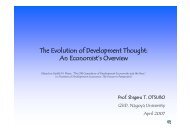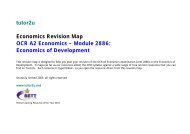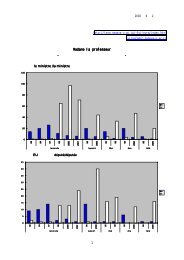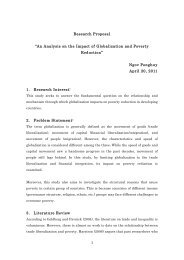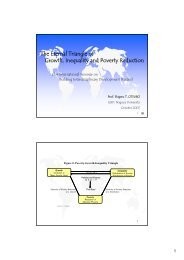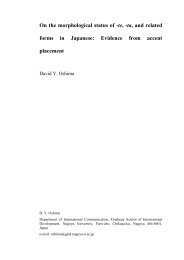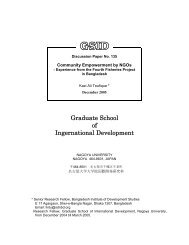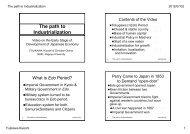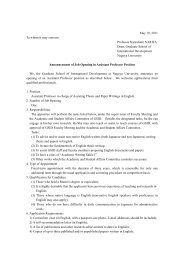Report
Report
Report
You also want an ePaper? Increase the reach of your titles
YUMPU automatically turns print PDFs into web optimized ePapers that Google loves.
CROSS-CUTTING ISSUES AND CONCLUSION 185<br />
experience of seven years, professional experience of<br />
two years, membership of recognised professional<br />
engineering associates, etc. Similarly, competency<br />
requirements for PE include application of engineering<br />
theory, standards and practices; management of engineering<br />
works; continuous development in engineering<br />
profession; etc. Assessment is done on the basis of a<br />
written examination, evaluation of professional, experience<br />
for at least seven years after acquiring engineering<br />
degree, evaluation of two years professional experience<br />
in significant engineering work and evaluation of CPD.<br />
Criteria for recognition of foreign engineers are:<br />
• Engineers registered as PE by the members of EMF<br />
shall automatically be certified in India. They will<br />
be exempted from examinations and other requirement<br />
as they would have been examined under an<br />
equivalent system and would have bachelor’s degree<br />
or equivalent in engineering from an accredited<br />
institution and at least seven years experience.<br />
• Others with engineering degree from foreign universities<br />
will be required to go through all the procedures<br />
including examinations as for engineers with<br />
Indian degree. As regards fee, it is same for the<br />
applicants from India and Nepal and different for<br />
other applicants from all other countries. It is also<br />
interesting to note that IEI provides guidelines for<br />
engineering students, polytechnic students, technicians’<br />
chapters, chartered engineers and professional<br />
engineers.<br />
Similarly, in Sri Lanka too there is no legislation<br />
passed by the Parliament that makes it legally binding<br />
for an engineer to register with the Institute of Engineers<br />
of Sri Lanka. However, Sri Lanka specifies organisations<br />
and companies for which membership with IEI is<br />
mandatory. Foreign engineers can acquire membership<br />
to the IEI provided they clear the local examinations.<br />
Where such membership is not required, foreign<br />
engineers can practice without membership.<br />
The institution of engineers, Bangladesh (IEB) is<br />
the national professional organisation of the country. 2<br />
It is registered under the Societies Registration Act of<br />
the country. IEB includes all disciplines of engineering.<br />
Currently, it has in its roll more than 25000 engineers.<br />
Since its establishments, IEB has been promoting and<br />
disseminating knowledge and practice of engineering<br />
and science. One of the major goals of IEB is to ensure<br />
the professional excellence and continuous professional<br />
development of the engineers in the country. It has also<br />
been working relentlessly to establish close and cooperation<br />
with the other professional bodies both in<br />
Bangladesh and outside the country.<br />
Established in 1968, Nepal engineers’ association<br />
(NEA) is an independent non-profit organisation of<br />
Nepalese engineers (NEA 2007). Today, it represents<br />
more than 7500 engineers. NEA was founded with a<br />
noble aim of developing engineering professionals to<br />
promote the development process by application of<br />
engineering sciences and technologies and at the same<br />
time increasing the interaction, goodwill and cooperation<br />
among engineers in Nepal and protect their<br />
professional rights. NEA also aims to develop relations,<br />
fellowship and goodwill with international engineering<br />
associations and institutions.<br />
As already discussed in Chapter 10, Pakistan engineering<br />
council (PEC) is the regulatory body established<br />
by an Act of Parliament which regulates engineering<br />
education, gives certification to professional engineers<br />
and advises government on all engineering and<br />
construction related issues. Perhaps Pakistan is the only<br />
SAFTA member country which has a statutory regulatory<br />
body for professional engineers.<br />
The Institution of Engineers, Pakistan (IEP) works<br />
as non-governmental organisation (NGO) under the<br />
Societies Registration Act. The institution provides<br />
platform for interaction between academia and other<br />
stakeholders and works for continuous improvement<br />
of engineering students, academia, and professional<br />
engineers. It came into existence in 1948, as successor<br />
to the Institution of Engineers, UK. The major objective<br />
of IEP is promoting professional development of<br />
engineers. IEP has concluded agreements of collaboration<br />
with 31 foreign professional societies including<br />
IEI; IEB; Institution of Engineers, Sri Lanka; and NEA.<br />
As engineering remains an unregulated profession<br />
in many of the South Asian countries their qualifications<br />
based on graded institutions and a minimum working<br />
experience in their home country should be considered<br />
adequate to allow them to work in all these countries.<br />
While efforts could be made to have a statutory body,<br />
as in the case of India, a bill is awaiting the Parliament’s<br />
approval, the aim should be that movement of engineers<br />
is not made hostage to a lack of statutory regulatory body.<br />
From the foregoing it appears that professional<br />
associations, with or without delegated governmental<br />
authority, perform a number of functions related<br />
to capacity building, development of curricula,<br />
2<br />
The Institution of Engineers, Bangladesh, http://www.iebbd.org/aboutus.htm, last visited on 9 December 2007.




